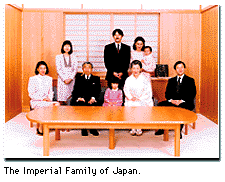The current Constitution took effect in 1946, soon after World War II. It states that the Emperor is "the symbol of the State and of the unity of the people," without powers relating to government. The Emperor is limited to symbolic roles, such as performing "acts in matters of state" as stipulated in the Constitution.
Like in Britain and Scandinavian countries, the Japanese monarch does not have a political function. In all his state functions, the Emperor must have the advice and approval of the cabinet. Based on cabinet decisions, he convenes the National Diet and dissolves the House of Representatives.
Based on the Diet's designation, he appoints the prime minister. Other duties include the promulgation of laws and treaties enacted and approved by the Diet and reception of credentials of foreign ambassadors.
 The reigning Emperor, Akihito, assumed the throne in 1989. The Emperor and Empress have two sons, Crown Prince Naruhito and Prince Akishino, and one daughter, Princess Sayako. They also have two granddaughters.
The reigning Emperor, Akihito, assumed the throne in 1989. The Emperor and Empress have two sons, Crown Prince Naruhito and Prince Akishino, and one daughter, Princess Sayako. They also have two granddaughters.
Members of the Imperial Family receive state guests from other countries and make overseas visits. Through these and other activities, they fulfill an important role in promoting international friendship.
Members of the Imperial Family also maintain wide contact with the citizens of Japan through their attendance of various events across the nation and visits to facilities for the handicapped and aged.
Photos courtesy of Imperial Household Agency.